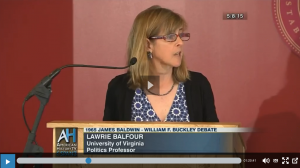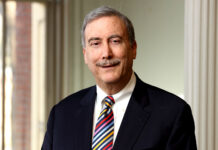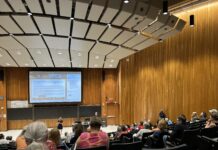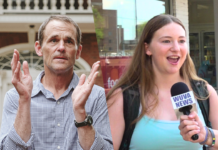
On Friday, the University Collective on Power, Violence & Equality (PVI) hosted a public lecture titled “Where Do We Go From Here? Martin Luther King, Jr., Reparations, and Emancipation.” The speaker was Professor Lawrie Balfour of the UVa Department of Politics, who centered her talk around King’s belief in America’s debt of injustice towards it citizens, which he felt it had “only begun to pay” during his lifetime.
Balfour, who is currently working on a range of projects in African American literature and politics, focuses her research on issues of race, gender, and democracy. She is the author of Democracy’s Reconstruction: Thinking Politically with W. E. B. Du Bois, a work she published with Oxford University Press in 2011.
During her talk, Balfour discussed King’s desire to root out one of the main evils of modern societies: economic disparities between the rich and the poor.
“At the heart of King’s scheme for repayment is the abolition of poverty,” Balfour said. “Real freedom, King argues, not only guarantees income, but also investments in education, and a radical expansion of rights.”
Balfour explained King’s need to examine the beliefs of his historical and political heroes, and advocated the same practice for current members of the UVa community.
“King’s appeal to the idea of abolition is not incidental,” Balfour said. “King returns to history in many ways across his speeches and his books…I think this move is really important, insofar as it squarely situates American democratic principles with the bondage of slavery.” In Balfour’s mind, for twenty-first century proponents of race reparations, “the past is a signifier of the yet-to-be-seen potential of American democracy.”
Studying the concept of America’s so-called “forgotten potential” is not just a modern concern among scholars; King was a student of this as well, Balfour explained.
“King discloses missed opportunities for establishing a genuinely democratic society,” Balfour told her audience in Nau Hall. “So let’s think about the unfinished business of the past…[King] rethinks the approach to U.S. history in really important respects. The opportunity to put democratic ideals into practice was eclipsed more than once in favor of the economic interests of slavery.”
By raising the topic of slavery, Balfour sparked a conversation about powerful Americans’ response, or a lack thereof, to calls for justice throughout history.
“King reiterates his concerns about the failed injunctions of white sincerity,” Balfour explained. “And King goes further. He notes that the celebrations of the progress of the Civil Rights Movement obscure how many people moved backwards during that period.”
When it comes to reparations, “the material commitment is part of the moral commitment, in a sense,” Balfour said. “Part of what King is trying to do is see how they go together. Probably everyone in this room has sung ‘We Shall Overcome’ in one context or another, but what King wants to do is to examine what happens the next day.”
Balfour lauded King for raising such important, if difficult, questions throughout his too-short life.
“One of things that King is asking us to do, as reparations advocates…is forcing us to say, ‘What are the limits of our imagination?’…If we can bring democracy to Iraq, or transform the tax code, why [are reparations] too expensive? It’s a reasonable question.”

Balfour stated that all citizens have a responsibility to take action when it comes to making substantive social change and that we should learn from the mistakes of history. She emphasized King’s message that legislative progress on civil rights issues is insufficient for provoking real change in society, citing “the timidity of the federal government in enforcing its own mandates.”
Balfour agreed with King in warning against looking to the federal government for “repayment” of past debts through legislation. “What would a reparations bill coming out of Congress look like?” she asked.
She stated that the ambiguity was simply too dangerous, and added that a government “solution” to race reparations would do little to spark real growth.
“When I use the language of reparations…it’s a lens from which we understand how to connect past injustice to ongoing injustice to future [social] progress,” Balfour said. “One of the real worries of advocating reparations at the federal level is that it would be ‘one time’…I think the idea of proliferation of these efforts is absolutely essential.”
Balfour promoted a critical, accurate evaluation of American political leaders and denounced sugarcoating.
“[King] lays bare the common rhetorical gesture, familiar to many of us at UVa, whereby the word ‘but’ acknowledges the hero’s weakness,” yet unjustifiably shields him from criticism, Balfour stated. “King’s emphasis on the ways that black communities have been damaged,” she explained, “poses a challenge for 21st-century interpreters.”
 “So, where do we go?” Balfour asked the audience. “King’s texts are haunted by a future in which a generation of dreams and sacrifices have come to nothing…Reading King, and particularly his texts in the 21st century, is disturbing. It ought to be disturbing…Have we learned from his contemporaries’ disregard for [black citizens]?”
“So, where do we go?” Balfour asked the audience. “King’s texts are haunted by a future in which a generation of dreams and sacrifices have come to nothing…Reading King, and particularly his texts in the 21st century, is disturbing. It ought to be disturbing…Have we learned from his contemporaries’ disregard for [black citizens]?”
Balfour claimed that Americans have not learned as they should have over the past 50 years, citing racially-charged issues such as mass incarceration. However, she encouraged optimism for the future.
“Admittedly, if we look to King, his theological commitments would disallow any conclusions that it is too late to pay back these debts,” Balfour said. “It would be a gross distortion to disavow King’s belief in the necessity of hope in what he saw as a God-created kingdom.”
While Balfour believed that hope is essential, she cautioned against dismissing reparations as inevitable in American society.
“[King] asks us to take seriously the demands for reparations since the slave era,” Balfour said. “This may be a moment where we are finally able to think about questions of living wage…Scholarships would be one component [of progress,] but also really thinking seriously about the structure of pay [in our communities].”
In the current day of controversial political protests over everything from the National Anthem at sports games to the place of historical monuments in our modern age, Balfour urged for students to contemplate the stain of slavery on our collective American identities and to think of the future.
“We must act now…to invest in those communities that bear the brunt of slavery’s unpaid debts,” Balfour said. “We are failing to fulfill our obligations to future generations, whose futures are in our hands.”
For videos of PVI events, click here.
Statement from PVI: The mission of the Power, Violence & Equality (PVI) Collective is to bring together scholars, students, and others in the University community to advance research, mentorship, and teaching focused on violence, in order to foster collaboration across disciplines. PVI is supported by UVa institutions such as the College of Arts & Sciences and the Maxine Platzer Lynn Women’s Center.

















I see you don’t monetize your blog, don’t waste your traffic, you can earn additional bucks every month because
you’ve got high quality content. If you want to know how
to make extra bucks, search for: Boorfe’s tips best adsense
alternative